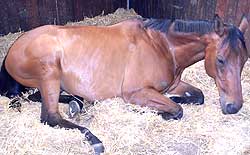
Colic in Horses - What it is, Causes, Symptoms, Treatment
The word colic refers to an attack of abdominal pain or stomach ache suffered by a horse or pony.
SYMPTOMS OF COLIC IN A HORSE OR PONY
 The signs
or symptoms of equine colic in a horse or pony
are different in every case - but the most common symptoms of colic to
look out for include:
The signs
or symptoms of equine colic in a horse or pony
are different in every case - but the most common symptoms of colic to
look out for include:
- The horse pawing at the ground and kicking at or turning to look at its stomach.
- Repeated Rolling
- Loss of appetite - the horse not eating his feed.
- The horse laying down or repeatedly getting up and down.
- Stretching out repeatedly, may appear to be trying to urinate
- Lack of or abnormal droppings
- Shaking and / or sweating
WHAT TO DO IF YOU THINK YOUR HORSE HAS COLIC
If you observe the above symptoms and that suspect your horse is suffering from a bout of colic, call your veterinary surgeon out immediatley. Colic can be fatal to a horse.
While you are waiting for the vet to arrive, carefully follow any advice that you have been given over the phone.
DIAGNOSIS OR COLIC IN A HORSE OR PONY
To diagnose colic your vet will ask you for a complete history of your horse or pony. and carry out a thorough examination.
The examination will often include temperature, heart and respiratory rates, hydration, examination of your horse's gums and listening to the intestines with a stethoscope.
It may also be necessary to perform a rectal examination on the horse to feel for any abnormalities.
A naso-gastric tube may also be used which passes through the horse's nostril to the stomach and helps determine whether abnormal amounts of fluid are present in the stomach.
Further diagnostic procedures are sometimes necessary and can include blood tests, peritoneal tap (passing a needle into the horse's belly to test for excess/abnormal fluid) or an ultrasound examination.
CAUSES OF COLIC IN A HORSE OR PONY
Factors that may predispose a horse or pony to suffer from a bout of colic include:
- A sudden change of feed or management
- Being fed poor quality horse feeds
- Dental disease which makes the horse unable to chew his feed properly
- Internal parasites such as redworms.
It's not always possible to determine the exact cause of colic in a horse or pony, but the following can be responsible for colic symptoms:
- Impactions (blockages in the gastro intestinal tract)
- Spasmodic colic (increased movement of the gastro intestinal tract)
- Gaseous distension or 'bloating'
- Equine stomach ulcers
- Twisting or displacements of a portion of the horse's intestines
- Infections of the sheath
- Problems with other organ systems (e.g. liver, muscle)
TREATMENT FOR A HORSE WITH COLIC
The vet may treat your horse at the stableyard with anti-inflammatories, anti-spasmodics, sedation and fluids.
Not all of these treatments will be used in every case, and the type of treatment will depend on the findings on examination of the horse or pony.
If the veterinarian is concerned that the cause is something requiring careful monitoring or intervention such as intravenous fluids, observation or surgery, referral to an equine hospital may be recommended.